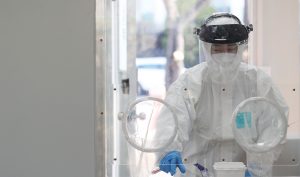Once an epicenter of the COVID-19 pandemic, South Korea’s success in containing the virus to date can mainly be attributed to widespread testing for the disease. As the situation is worsening globally, South Korea’s ability to send diagnostic kits abroad not only translates into immediate commercial gains, but helps to secure its long-term economic security more generally as well.
South Korea has tested nearly 500,000 people for COVID-19 as of Thursday. At the height of the domestic crisis in late February and early March, South Korea was testing around 20,000 people per day; that has recently dipped to under 10,000 as other efforts to contain the virus take hold. Still, the South Korean companies behind the kits are now churning out enough to test at least 135,000 people per day. The stabilizing situation at home has enabled these firms to export more of this extra capacity.
Last month, a total of 27 South Korean firms exported testing kits, including the five local biotech firms whose kits have emergency-use approval from Seoul. Collectively, they exported $48.6 million worth of testing kits, with prospects for April looking even higher. Over 120 countries have so far reached out to Seoul asking either to purchase tests or for them to be sent as humanitarian aid.
The most notable of these requests came from U.S. President Donald Trump. On a March 24 call with South Korean President Moon Jae-in, Trump asked Moon for help with medical supplies, acknowledging these would first need to receive approval from the U.S. Food and Drug Administration (FDA). Some confusion ensued after Seoul’s announcement that three local companies had received FDA approval without the firms themselves knowing such a decision had been made. Regardless, South Korean firms have been able to tap into the growing demand from the United States, where the number of new coronavirus cases is currently outpacing anywhere else in the world. The city of Los Angeles has purchased 20,000 diagnostic kits from the South Korean company Seegene for $1.25 million, with plans to up the deal to 100,000 tests per week. Another manufacturer, Eone Diagnomics Genome Center, will soon send kits to test up to 1 million Americans through contracts with various state governments.
Outside of the U.S., leaders from Bulgaria, Canada, China, Columbia, Egypt, Ethiopia, France, Lithuania, Peru, Saudi Arabia, Spain, Sweden, Turkey, the UAE, and the U.K. have all personally asked Moon for help with medical supplies, particularly testing kits. South Korean companies have also sent or agreed to send hundreds of thousands of tests to Brazil; Columbia; Japan; the UAE; and various European countries, including Italy, Hungary, Poland, and Romania; among other countries.
Following the model of strong public-private sector cooperation initially adopted to address the virus, Seoul has stepped up its efforts to work with diagnostic test manufacturers to help keep pace with global interest. On March 26, various international and health-focused public agencies formed a special task force to monitor the domestic supply of testing kits and discuss details of overseas support. The Korea International Trade Association (KITA) is specifically looking to support businesses exporting testing kits and other related medical supplies. KITA plans to provide information to foreign governments regarding South Korean companies exporting medical supplies, though each will first need to undergo a screening process. As of April 6, 360 companies have applied.
For Seoul, these exports are potentially worth much more than their face value. Exports of COVID-19 tests represent a crucial opportunity for domestic growth and job creation while on the precipice of an economic crisis, but even more so they can help limit the toll the virus extracts from countries around the world. Considering how the ongoing pandemic has highlighted South Korea’s dependence on the rest of the world, to best help itself, South Korea now needs to help others where possible.
Other than the challenge of scaling production to meet demand, there are two other issues with the potential to slow or even halt these exports. First is the possible disruption to supplies of ingredients from abroad needed to produce the kits. South Korean industry groups have already raised the issue, but the situation could deteriorate if countries attempt to stockpile key supplies. Second is the government’s ability to keep the virus contained amid expectations of an imminent return to normal social activity. Critics warn of “a loosening sense of crisis” that could easily cause the case numbers to explode again. Should this come to pass, less testing kits would likely be available to send overseas.
Until a vaccine is discovered, tests like South Korea’s are seemingly the most effective way to curb the spread of the virus. Seoul has proven effective in shipping out COVID-19 diagnostic tests so far, but to make the most out of its current position – both for itself and the world – will require further cooperation with other governments and keeping the virus in check at home.
































